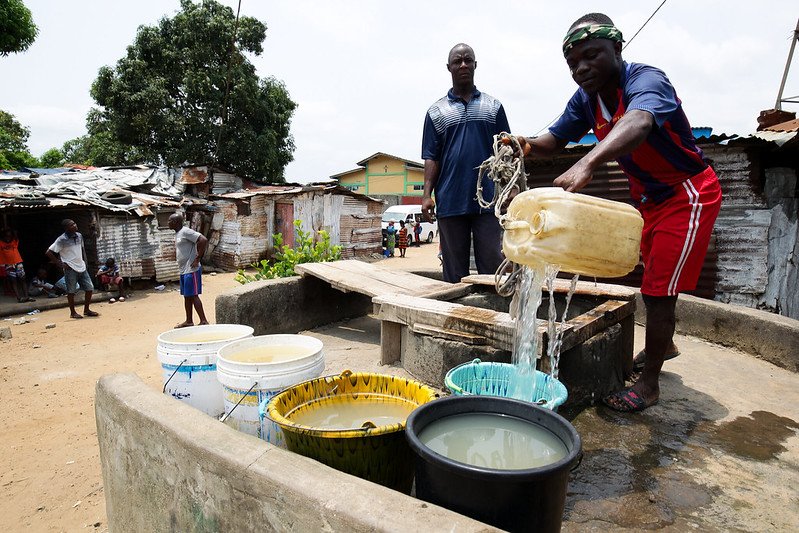MONROVIA, Liberia—Since taking office five months ago, President Joseph Boakai has focused on his 100-day deliverables, with a significant emphasis on Water, Sanitation, and Hygiene (WASH). Experts highlight WASH as vital for the safety, health, and overall well-being of Liberia’s citizens. Among Boakai’s key commitments were plans to “connect 250 households to the public water supply network” and to “purchase necessary quantities of chemicals for maintaining clean water supplies.” Additionally, he promised the deployment of “sewage desludging trucks with rodding equipment and appropriately trained staff.”
Anthony Myers, Deputy Finance Minister for Fiscal Affairs, reported substantial progress, stating at a recent government press conference, “95% of water reservoirs in Paynesville and Monrovia were repaired and are now active.” The government’s “100-day action plan assessment report” further noted that “cleaning of sewage is at 20% and is anticipated to significantly increase.” The Liberia Water and Sewer Corporation (LWSC) has also commissioned four additional sewer tankers to aid in this effort. The government claims to have spent over $23.4 million on its deliverables, though the report did not specify how much of this was allocated to WASH.
The achievements highlighted in the 100-day assessment report include the commissioning of a one-million-gallon reservoir on Broad Street, Monrovia, intended to connect many residents in central Monrovia by May 2024. According to Mohammed Ali, Managing Director of the LWSC, the project cost $41,000. However, there has been no update on the number of homes connected with water in Bushrod Island and Kakata.
Reactions to the Boakai administration’s performance in the WASH sector have been mixed. Timothy Kpeh, Executive Director of the United Youth for Peace, Education, Transparency, and Development in Liberia, rated the government’s performance as “fairly well” overall but criticized it as “poor” in certain areas, such as failing to “clean all sewage spillage in central Monrovia,” improve water supply to Bushrod Island, and restore piped water to Kakata.
WASH is a crucial component of the Boakai administration’s ARREST (Agriculture, Roads, Rule of law, Education, Sanitation, and Tourism) agenda. In his inaugural address in January, President Boakai underscored the importance of sanitation. However, the government’s allocation to WASH in the 2024 national budget has raised concerns. Of the $738.9 million budget, only $891,200 was allotted to the WASH Commission, with a significant portion allocated to employee compensation. Just $473,926 is budgeted for “restoration of water and cleaning up sewage spillage” by the LWSC, and a mere $5,000 is allotted to “water and sewage” under the Ministry of Public Works’ $35.5 million budget.
Kpeh expressed disappointment over the allocations, emphasizing the urgent need for increased investment in the WASH sector. “We were expecting at least 3 to 5% of the national budget to be allocated to WASH,” he stated. “Today, it is reported [by the World Bank] that Liberia loses 17.5 million USD annually, and over 3,000 people die each year due to poor WASH services. Liberia will not meet the SDG 6 without prioritizing WASH.”
Maryland County Representative Anthony F. Williams, Chair of the House Committee on WASH and the Environment, acknowledged the need for more funding and explained that administrative transitions within the WASH Commission affected budget presentations. “The commission was in a state of administrative transition, marked by tension between the old and new administration. This situation prevented proper presentation of their 2024 plans to the Ways, Means, and Finance Committee,” he explained.
Despite progress, the government’s 100-day report did not address rural areas, where “60% of people engage in open defecation,” according to PLOS Water. A 2019 Unwater report highlighted a significant funding gap in WASH services in Liberia. WaterAid has been instrumental in addressing these issues, funding numerous water point projects across the country and supporting government initiatives.
A 2020 UNICEF, WHO, and JMP report indicated that 75% of Liberia’s population had access to basic drinking water, with urban areas faring better than rural ones. However, a June 2024 report by Action Contre La Faim revealed that “37% of deaths in children under five are due to pneumonia or diarrhea, both affected by water, sanitation, and hygiene.” The report emphasized the severe impact on rural communities, where lack of access to clean water and adequate sanitation heightens vulnerability to water-borne diseases.
In Yahyonyon Town, Todee District, Montserrado County, WaterAid’s interventions have significantly reduced WASH-related diseases, including diarrhea, demonstrating the critical need for sustained and increased investment in WASH across Liberia.

